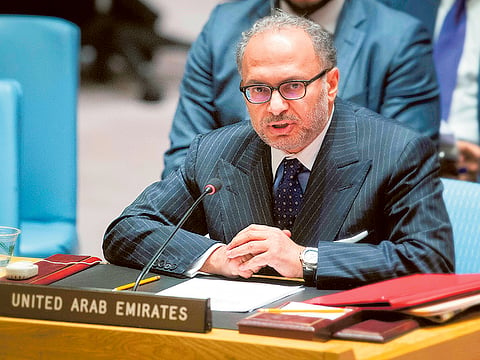UAE committed to set up group to counter extremism
UAE committed to launching a diplomatic initiative and facilitating dialogue, Dr Gargash says at UN

New York: The UAE announced on Tuesday night at the UN Security Council that it intends to launch a new diplomatic initiative aimed to build international cooperation and facilitate dialogue through a ‘Contact Group on Countering Extremism’.
This strategic effort would focus on developing and disseminating concrete solutions and best practices in countering extremism. Progress made through the Contact Group will complement and reinforce the efforts of the anti-Daesh coalition and support the UN in taking effective collective measures for the prevention and removal of threats in conformity with the principles of justice and international law, as enshrined in the UN Charter.
Dr Anwar Mohammad Gargash, Minister of State for Foreign Affairs, in his statement at the Open Debate of the UN Security Council, reaffirmed the commitment of the UAE to the core principles of the Charter.
Dr Gargash offered some suggestions for strengthening the UN to deal with the range of complex and evolving challenges that exist today. First, the Security Council should increase its consultation and coordination with concerned states to prevent conflict. This would make the Council more effective and ensure that the full range of perspectives of those countries most affected was considered. Second, Dr Gargash called for greater involvement and support for regional organisations, as stipulated in Chapter 8 of the Charter. Their role as essential components of the international security system must be utilised and supported by the Security Council. Third, he highlighted the human cost of protracted international inaction — with specific reference to the plight of the Syrian and Palestinian people.
With regard to Yemen, the UAE commended the Security Council, and specifically Jordan and the UK, for ensuring consultation of the Gulf Cooperation Council on Resolution 2201. Implementation was now the priority. Dr Gargash stated that the UAE reaffirmed its commitment to the legitimate government headed by President Abd Rabbo Mansour Hadi, called for the release of Prime Minister Khalid Bahah from house arrest, and urged a return to the political process that was derailed through the use of force by the Al Houthi militias.
Expressing the UAE’s horror at ongoing terrorist attacks plaguing Libya and neighbouring countries, Dr Gargash extended the UAE’s full support for UN Special Representative of the Secretary-General Bernadino Leon’s endeavours. However, he noted a political strategy must be accompanied by a muscular posture. This would ensure that extremism and terrorism did not take advantage of the ensuing international mediation. He reiterated the UAE’s call to lift the arms embargo on the legitimate Libyan authorities, which, he observed was a necessary step for the legitimate Libyan government and the House of Representatives to exercise their sovereign power. The risks of militants gaining control over Libya’s resources and utilising them to export extremist activities across borders constituted a complicated and dangerous threat if unchecked.
Dr Gargash also took the opportunity to note the progress made by the international community with regard to the fight against Daesh. The UAE was one of 60 states to attend the White House Summit on Countering Violent Extremism in Washington, where the Anti-Daesh Coalition confirmed it has made strategic advances on the ground. At the UN, a number of resolutions had been adopted to cut off the financial lifelines, stem the flow of foreign fighters and inhibit the use of social media by these groups.
While these efforts have been vital in the global campaign to tackle the threat of extremism, the UAE stressed the urgent need to focus on cooperating to eliminate the root causes of extremism. This challenge requires a global, coordinated and multi-stakeholder effort.
Sign up for the Daily Briefing
Get the latest news and updates straight to your inbox



